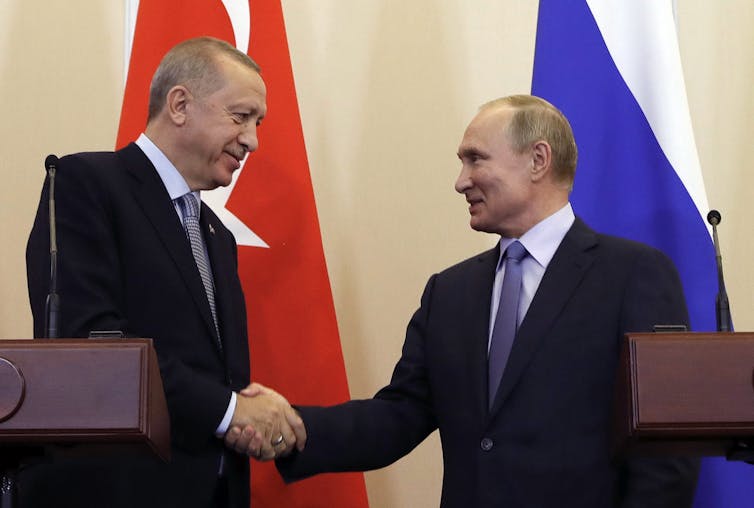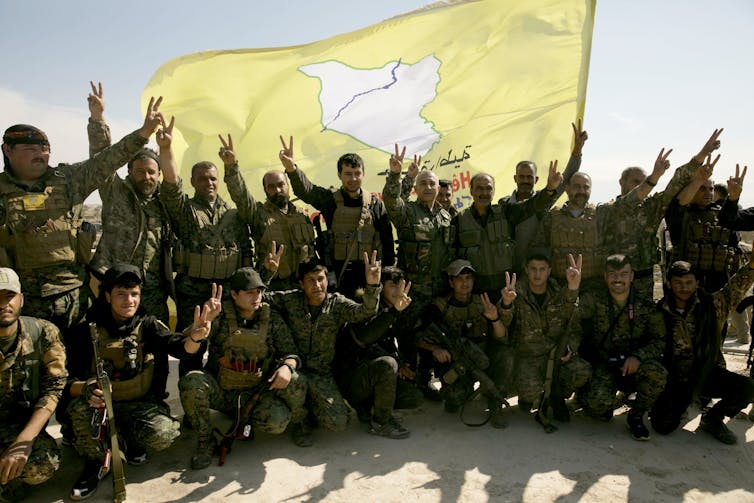Syria military presence risks US credibility with world community
- Written by David Banks, Professorial Lecturer of International Politics, American University School of International Service
President Donald Trump’s decisions to withdraw U.S. troops from northern Syria – and then to send them back into action – has raised new concerns around the world about the reliability of U.S. promises.
Since the beginning of Trump’s presidency, I and other[1] foreign policy scholars have worried that Trump’s tendencies toward hyperbole, exaggeration and outright lying[2] could disrupt a relatively stable international community.
For the last several years, I was relieved to find that didn’t happen. Some of the president’s public statements about NATO[3], trade and nuclear weapons were concerning, but largely didn’t result in major shifts in U.S. policy or changing courses of American action.
However, by announcing that the U.S. military in northern Syria would leave positions they occupied between Turkish and Kurdish forces – two U.S. allies who viewed each other as enemies – and then apparently reversing that decision[4], Trump has likely caused U.S. allies and rivals to view American commitments in a new, uncertain light.
Other countries have seen how quickly the U.S. can reverse longstanding commitments. They may now adjust their own diplomatic and military strategies to depend less on the U.S. That, in turn, may reduce the power and influence the U.S. has in the international community, increasing global instability.
 Turkish President Recep Tayyip Erdogan, left, long a U.S. ally, has made a new agreement with Russian President Vladimir Putin.
Presidential Press Service via AP, Pool[5]
Turkish President Recep Tayyip Erdogan, left, long a U.S. ally, has made a new agreement with Russian President Vladimir Putin.
Presidential Press Service via AP, Pool[5]
Slow-moving bureaucracy
In the first several years of the Trump presidency, bureaucratic lack of action in the Pentagon and the State Department meant that statements from the president didn’t actually change what U.S. troops and diplomats did in other countries.
The message other nations took from that was that they couldn’t totally ignore the president’s words, but they did not need to worry[6] about their implications very much. Despite what Trump said, they felt they could continue to depend on the U.S. for assistance, aid and support.
For instance, a Japanese foreign ministry official told the Japan Times newspaper, “The Japanese government shouldn’t react to a tweet[7] by the president each time … If it’s their official position, we need to deal with it, but the president says various things.”
Put another way, Trump’s statements were hurting the reputation of the U.S., but not damaging the country’s credibility about its commitments.
To many scholars of foreign policy, this might be surprising. The behavior of a country’s leader[8] is expected to affect that country’s global reputation[9], which is usually key to international credibility. Developing consistent positions deters would-be challengers[10] of U.S. allies or interests.
That’s why national officials in the U.S. and around the world are typically quite careful with what they say and how they say it[11].
Sticking with the message
In general, the U.S. and other countries do best if they clearly state their positions and follow up on them. Saying one thing one day and doing something contradictory the next scrambles observers’ perceptions. The uncertainty could embolden rivals and make allies nervous.
For instance, in 2012, President Barack Obama declared that using chemical weapons would be a “red line[12]” Syrian leader Bashar Assad should not cross. When Assad did attack his own people with chemical weapons, Obama did not order a military response, and was widely[13] criticized[14] by politicians and foreign policy elites for not[15] matching his words with actions[16]. Obama’s vacillation was blamed for Assad’s subsequent use[17] of chemical weapons.
However, many observers exaggerate the importance of reputation. As political scientist Jonathan Mercer notes[18], when one government tries to predict another’s behavior, it is more likely to consider the opposing leader’s immediate strategic circumstances rather than his or her past behavior.
For instance, rather than interpret Obama as weak and irresolute for not responding to Syria’s use of chemical weapons, Assad may have seen the excoriation that Obama suffered for failing to respond to their use, but also seen Congress’ reluctance to endorse military measures.
Thus, rather than become more emboldened by Obama’s irresolution, Assad may have recognized that Obama’s hesitation to strike Syria was due to other factors beyond his own character and reputation.
A focus on credibility
U.S. credibility may have survived well into Trump’s presidency because it’s not just simply based on reputation.
Rather, as scholar Shiping Tang notes[19], what the president says isn’t necessarily the only thing that determines a country’s credibility. Its interests and what it can actually do are also important factors.
While Trump’s erratic leadership style chipped away at the U.S.’s reputation, the other two pillars of its international credibility appeared solid. And even though Trump expressed skepticism about U.S. commitments to NATO, for instance, the steady behavior of institutions such as Pentagon and the State Department suggested U.S. capabilities and interests had not changed.
 Kurdish-led Syrian Democratic Forces troops counted on U.S. support in the fight against the Islamic State group.
AP Photo/Maya Alleruzzo[20]
Kurdish-led Syrian Democratic Forces troops counted on U.S. support in the fight against the Islamic State group.
AP Photo/Maya Alleruzzo[20]
However, the president’s decision to abandon longtime Kurdish allies in Syria showed that U.S. strategic interests may seem predictable, but actually can change very suddenly.
Indeed, the fact that Trump’s move surprised officials in the Pentagon and the State Department[21] – who had no warning of the decision – means that foreign allies cannot be sure what U.S. interests are.
These uncertainties are further compounded by the president’s refusal to share with Congress or the American public the details of his discussions with world leaders. Nor will he reveal whether he has any potential private conflicts of interest that might be influencing him. All that U.S. allies and rivals can ascertain from the Syria decision is that the country’s security interests shifted without warning.
Until this recent decision about Syria, when the world struggled to decode the president’s confusing statements, foreign leaders could still count on core U.S. interests remaining constant. However, the prospect that U.S. foreign policy could change significantly, without warning or explanation, means other countries can’t trust what the U.S. says – and they’ll act accordingly.
The Kurds, for instance, quickly allied with the Assad regime[22] they had been fighting against. Allies like Afghanistan might feel pressure to negotiate settlements with potential U.S. enemies or rivals, to protect them if American support ends suddenly. Closer allies, like Japan and the European Union, may also feel the need to deepen ties with U.S. rivals to guard against the day America turns away from them, too.
[ Deep knowledge, daily. Sign up for The Conversation’s newsletter[23]. ]
References
- ^ I and other (time.com)
- ^ hyperbole, exaggeration and outright lying (www.washingtonpost.com)
- ^ NATO (www.cnn.com)
- ^ apparently reversing that decision (www.nytimes.com)
- ^ Presidential Press Service via AP, Pool (www.apimages.com)
- ^ did not need to worry (www.independent.co.uk)
- ^ The Japanese government shouldn’t react to a tweet (www.independent.co.uk)
- ^ behavior of a country’s leader (press.princeton.edu)
- ^ affect that country’s global reputation (www.cornellpress.cornell.edu)
- ^ would-be challengers (yalebooks.yale.edu)
- ^ what they say and how they say it (www.worldcat.org)
- ^ red line (www.washingtonpost.com)
- ^ widely (www.brookings.edu)
- ^ criticized (www.businessinsider.com)
- ^ for not (www.washingtonpost.com)
- ^ words with actions (www.washingtonpost.com)
- ^ Assad’s subsequent use (www.theatlantic.com)
- ^ Jonathan Mercer notes (www.worldcat.org)
- ^ Shiping Tang notes (doi.org)
- ^ AP Photo/Maya Alleruzzo (www.apimages.com)
- ^ surprised officials in the Pentagon and the State Department (time.com)
- ^ allied with the Assad regime (www.nytimes.com)
- ^ Sign up for The Conversation’s newsletter (theconversation.com)
Authors: David Banks, Professorial Lecturer of International Politics, American University School of International Service
Read more http://theconversation.com/syria-military-presence-risks-us-credibility-with-world-community-125521

